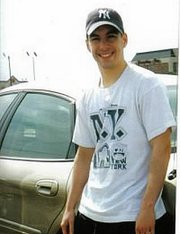The Post & Courier
by Glen Smith

Matthew Steubing committed suicide by jumping from the Silas Pearman Bridge in Charleston on July 18, 2003. He was 18.Matthew Steubing committed suicide by jumping from the Silas Pearman Bridge in Charleston on July 18, 2003. He was 18.
Darkness hung over Charleston Harbor as Matthew Steubing parked his Ford pickup truck on the aging bridge and left a note on the seat beside his Bible. He put on a life jacket and began to climb — up, up, into the span’s superstructure.
Then, he jumped.
His parents were waiting for Matthew to arrive home in Winchester, Va., when they received the news on July 18, 2003. Their 18-year-old son plunged more than 160 feet from the Silas Pearman Bridge before slamming into the Cooper River. He was gone.
“Our world blew apart,” his mother, Celeste Steubing, said. “We couldn’t imagine this happening because this wasn’t Matthew. … It made no sense.”
Matthew, the youngest of six children, had been a vibrant kid, happy and full of life. But after a rough patch in his senior year of high school left him feeling down, a psychologist suggested he would benefit from the antidepressant drug Lexapro. He soon became withdrawn and anxious, his parents recalled during a recent visit to Charleston.
Matthew committed suicide just nine weeks after starting on the drug. Only later did his family learn that antidepressants carry a heightened risk of suicide in children, the Steubings said.
The Steubings have made it their mission to warn other parents about the hidden dangers of psychiatric drugs. To that end, Celeste Steubing was featured in the recently released documentary, “Dead Wrong,” produced by the Los Angeles-based Citizens Commission on Human Rights.
The 90-minute film profiles Matthew’s story and documents Celeste Steubing’s travels to speak with doctors, health experts, drug counselors and other mothers with painful tales of loss associated with psychiatric drugs.
Forest Laboratories, makers of Lexapro, would not comment on Matthew Steubing’s case but defended the drug’s safety in a prepared statement. The company stated that antidepressants such as Lexapro have been associated with a substantial reduction in the suicide rate in the United States.
“Forest has tremendous sympathy for any family dealing with the suicide of a loved one, and Forest understands that family members dealing with such a tragedy often are looking for answers,” the statement read. “However, Lexapro is a safe and effective medication for the treatment of major depressive disorder in patients as young as 12, when used according to the FDA-approved package insert.”
Celeste Steubing and her husband, Daniel, said Matthew had never been suicidal before going on the drug, which was prescribed by a doctor to correct a perceived chemical imbalance.
The couple said they would not have given Matthew the Lexapro had they known it carried a risk of increased suicidal thinking and behavior in children and young adults. The drug’s label now carries that “black box” warning.
Matthew quickly went downhill on the drug, the Steubings said. He had trouble sleeping, lost weight and seemed agitated and out of sorts. Normally outgoing, he became distant and isolated, they said.
“He was like a caged cat,” his father said. “We couldn’t understand what was happening to him.”
After balking at a long- anticipated beach trip with friends, Matthew opted to travel to Charleston in July 2003 to visit his older brother Eric, who was attending college here. He stayed for 10 days before bidding his brother goodbye on July 18, 2003. Matthew called his mother that day to report his progress heading home. His last call indicated he had just passed through Roanoke, Va.
In reality, Matthew was still in the Charleston area, apparently planning his own death. In the note he left behind, he indicated that he wore a life vest so his family wouldn’t have to look for his body and worry about where he was.
After reading an article about a possible link between antidepressants and suicide, the Steubings started digging and doing research of their own. The more they learned, the angrier they got.
They went on to testify at a 2004 Food and Drug Administration hearing in Washington, D.C., that led to the warning labels. Telling Matthew’s story still brings pain and tears, but they continue to speak out.
“It’s important so that other parents don’t have to go through the heartache and anguish we have,” Celeste Steubing said. “So that other parents don’t have to miss their children for the rest of their lives like we do.”
http://www.postandcourier.com/news/2010/nov/27/parents-warning-others/
To view the documentary, Dead Wrong: How Psychiatric Drugs Can Kill Your Child, click here http://www.cchr.org/take-action/parents/message-to-parents.html


SHARE YOUR STORY/COMMENT